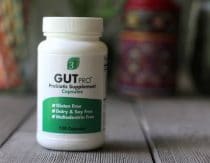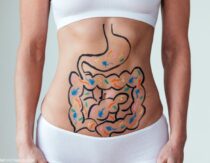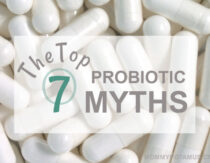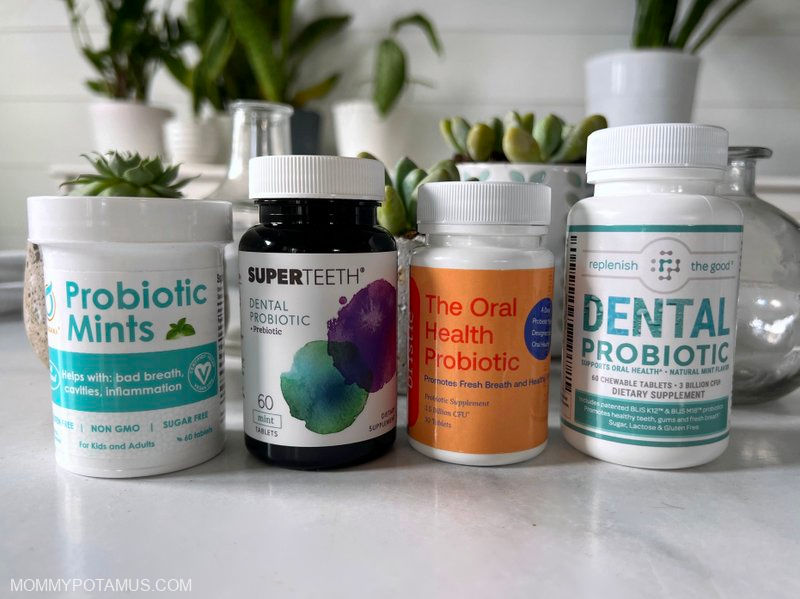
Did you know that approximately 700 species of microbes live in your mouth – on your teeth, tongue, lips, gums and everywhere in between? (1) If you’re like me, there’s probably a point in your life when hearing that fact would have made you want to swish an entire vat of mouthwash. Health isn’t about eradicating all microbes, though . . . it’s about making sure we nurture the good ones.
After over a decade of focusing on gut health through probiotics, fermented foods and and staples like bone broth, I thought I had a pretty good handle on how to support a diverse microbiome. Then a few years ago, a dental hygienist put a sample of my saliva under a microscope for me to look at, and I realized I had more work to do.
Dental Health Impacts Total Body Wellness
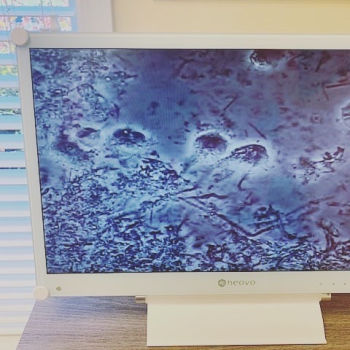
Our oral microbiome, which is the community of bacteria, yeasts, and other microbes that live in our mouths, has a profound effect on both dental and overall health.
We know, for example, that the presence of certain periodontal pathogens can trigger inflammatory responses and/or travel to other parts of body, negatively impacting the gut, cardiovascular system, and even brain. (2)(3)(4)
On the flipside, certain beneficial oral strains increase nitric oxide, which plays a vital role in keeping our immune defenses strong, supporting cardiovascular health, and optimizing cognitive function. (5) (6)
Your oral microbiome also influences whether your breath feels fresh or has the sulphuric odor associated with bad breath – more on that later.
Where Did All The Good Guys Go?
Like other ecosystems, diversity is a key biomarker of resilience and vibrancy, but unfortunately modern life has not been kind to our oral microbiome. (7) Sugary foods, antibacterial mouthwashes, traditional toothpastes and other factors can cause oral dysbiosis – or an imbalance of the microbes in the mouth.
For many of us, these losses were sustained a long time ago and we simply don’t encounter enough beneficial oral bacteria to re-balance things.
Fortunately, though, there are groups of people that continue to experience excellent dental health, and that’s given researchers an opportunity to see what microbial strains they share in common. Their findings have led to the creation of dental probiotics, which allows those of us who don’t naturally have the same beneficial strains to incorporate them into our oral microbiome.
Before we dive into the details, I want to mention that none of these statements have been evaluated by the FDA, this article is not medical advice, and it is not meant to diagnose or treat any condition. As always, please talk with your healthcare provider about any supplements you are considering. Now that we’ve got that out of the way, let’s take a look at the research.
What exactly is a dental probiotic?
Dental probiotics are probiotics that contain strains which benefit oral health. In order to help them populate the mouth, they’re usually consumed as lozenges (or “candies” as my kids call them) that are sucked on or chewed rather than swallowed. This method of delivery allows them to have maximum contact time with the area they’re intended for.
Most lozenges contain between 1-3 bacterial strains that are native to the mouth area and have been shown via clinical studies to support oral health.
5 Benefits of Dental Probiotics
Research suggests that the good bacteria found in dental probiotics compete with specific strains of bacteria known to cause tooth decay. They can also improve oral pH, reduce bad breath and more. Let’s take a closer look at some of the potential benefits.
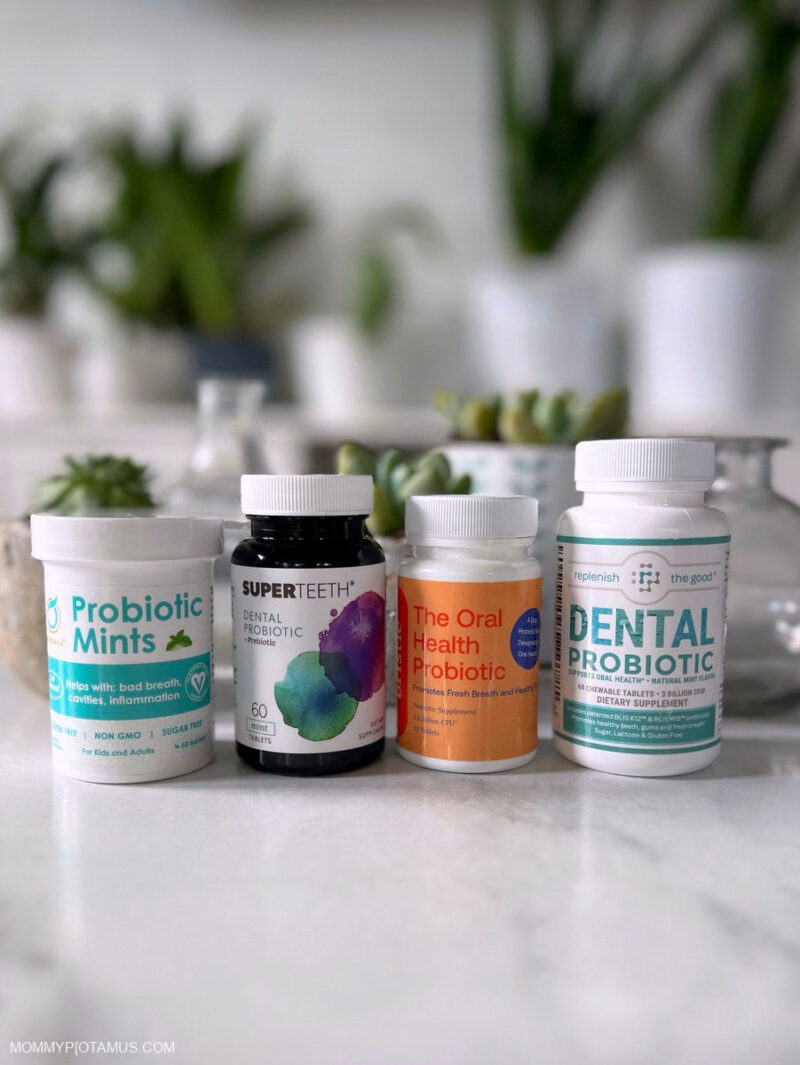
1. May Reduce Levels of Bacteria Associated With Tooth Decay
You know what plaque is – the soft, sticky film that builds up on teeth – but have you ever wondered why dentists are so insistent about getting you to reduce your levels?
Plaque is a biofilm that’s made by oral bacteria as a sort of shelter for them to live in. A little plaque is normal, but excessive plaque buildup can lead to problems including gum inflammation, bad breath and tooth decay.
One strain of bacteria that generates a lot of plaque is Streptococcus mutans – it’s considered to be one of the primary causes of tooth decay and cavities. It tends to form large biofilm colonies that convert dietary sugar into enamel-eroding lactic acid.
Fortunately, S. mutans has a few natural competitors. Streptococcus salivarius M18, for example, is a rare beneficial strain that competes with it and another plaque-producing strain, Streptococcus sobrinus. (8)
Only about 2% of the population have naturally high levels of Streptococcus salivarius, which is a bummer because it does more than just compete for space. It also releases several compounds (Salivaricin A, Salivaricin 9, and Salivaricin M.) that attack S. mutans, plus one enzyme (dextranase) that breaks down plaque and another (urease) that helps neutralize acid and balance oral pH. (9)(10)
In addition to Streptococcus salivarius M18, other strains of beneficial bacteria that naturally compete with Streptococcus mutans include:
- Streptococcus A12 (11)
- Lactobacillus paracasei (12)
- Lactobacillus reuteri (13)
Important note: While certain probiotics may help balance the oral microbiome, they do not completely eliminate the bacteria that contributes to decay. The FDA has not approved any dental probiotic to prevent any oral issue like cavities, and I don’t rely on them alone to support my oral health.
However, I do consider them to be a valuable part of my oral care routine along with brushing, flossing, avoiding excessive amounts of sugar, and going to the dentist for regular cleanings.
2. Helps With Bad Breath
Most products that are sold to freshen breath focus on one of two approaches:
- Masking odor
- Killing the bacteria that cause halitosis (bad breath)
Bad breath is most commonly caused by a group of bacteria that produce smelly volatile sulfur compounds (VSCs) as they break down foods.
The rotten eggs odor some people associate with unpleasant breath usually comes from a VSC called hydrogen sulfide, while others such as methyl mercaptan smell like rotten cabbage. (14)
Because bacteria repopulate quickly, methods that mask odor or kill the bacteria tend to have pretty short-term effects.
Dental probiotics take a different approach. Instead of trying to kill the strains of bacteria that cause halitosis, dental probiotics introduce beneficial strains that compete with them. (14)
In this study, 85% of the participants who took an oral probiotic containing two strains of Streptococcus salivarius – K12 and M18 – experienced a significant reduction in VSC-producing bacteria in just one week. Even better, they maintained these lowered levels for two weeks after the last lozenge.
Some of the strains that have been specifically found to be helpful for freshening breath are:
- Streptococcus salivarius K12
- Streptococcus salivarius M18
- Lactobacillus salivarius WB21 (15)
3. Supports Gum Health
Excess plaque near or beneath the gum line can cause irritation, bleeding, and other issues. Several studies have found that dental probiotics can support oral health by reducing plaque formation near and/or beneath the gums.
Some of the strains that have been specifically studied for gum health are:
- Lactobacillus reuteri (16)
- Lactobacillus brevis (17)
4. Supports Ear, Throat & Respiratory Health
Quick Story: Once upon a time, there was a remarkable a boy growing up in Dunedin, New Zealand. While others struggled with throat and respiratory issues, he stayed well through the harsh winters year after year. When curious researchers decided to try to find out why, they discovered that he carried the rare strain of bacteria I mentioned above – Streptococcus salivarius K12.
Research indicates that S. salivarius K12 competes with certain species of pathogenic bacteria, including some that are linked to sore throats, earaches, and respiratory issues. (18)
Other beneficial strains may support the ear, nose and throat areas as well. In this study, kids who took a probiotic containing Streptococcus salivarius K12, Streptococcus salivarius M18, Lactobacillus reuteri, Lactobacillus sakei, and Lactobacillus paracasei enjoyed better overall respiratory function than those who did not. (19)
To recap, the strains that have been studied for ENT and overall benefits include:
- Streptococcus salivarius K12
- Streptococcus salivarius M18
- Lactobacillus reuteri
- Lactobacillus sakei
- Lactobacillus paracasei
5.Supports Overall Health
A good oral care routine supports overall health, including gut health and cardiovascular health. According to ethnopharmacologist Dr. Nelson-Dooley, “In people with coronary artery disease, simply beginning an oral hygiene program reduced their cardiac events.” (20)
On the flipside, “One study showed that using mouthwash eliminated the beneficial effects of healthy oral bacteria and raised blood pressure.”
Also, we swallow about 1 trillion microbes per day – a process that profoundly impacts our gut microbiome and overall digestive health.
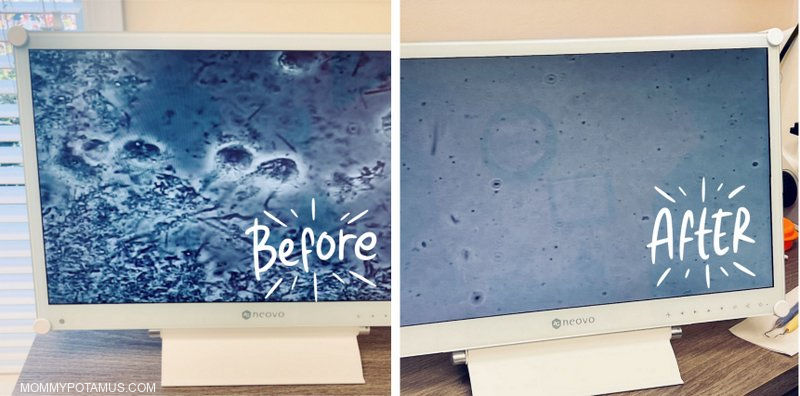
My Experience
A few years ago, my dental hygienist popped a sample of saliva under a microscope for me to look at before he started my routine cleaning. Despite many years of focusing on gut health, I was surprised to see a lot of yeast, a higher concentration of overall bacteria than is considered optimal and lot of white blood cells (which may suggest infection or stress).
My dentist reviewed the results and sent me home with instructions to use dental probiotics and a water flosser. I haven’t been great about water flossing but I did incorporate dental probiotics plus a teeth whitening light therapy device from Primal Life Organics, and subsequent samples have shown steady improvement.
The “after” photo above was taken before my last cleaning. I mention the light therapy device because some research suggests red and blue light can also positively impact the oral microbiome. If you want to try it out you can buy it for about half the retail price here.
That said, my husband and kids also had noticeable improvement with their samples (my husband’s was pretty impressive, actually). They didn’t add light therapy into their routine, so based on their results I consider probiotics to be a worthwhile part of our oral care routine.
What To Look For In A Dental Probiotic
When I started looking for a good dental probiotic, I came across a brand that seemed way more affordable. Everything looked good until I realized two things:
- Lower Potency, Higher Cost – The cheaper brand suggested that I take two lozenges instead of one in order to achieve the potency of other brands. When I calculated the cost of going through the bottle twice a quickly I realized I’d actually be paying more, not less.
- Storage Issues – The cheaper brand also had to be refrigerated, which would basically make it my job to keep track of when my kids brush their teeth so I can remind them to go to the kitchen to take it. They’re very responsible kids but even I have trouble remembering, so I know that’s what would end up happening. Nopety nope nope, I only choose brands that are specially formulated to retain potency at room temperature. That way everyone has a bottle next to their toothbrush – easy peasy.
Although more research is needed to determine what potency, frequency and specific strains are best to achieve different goals, below are some brands that use several of the strains mentioned in this article and have the cleanest ingredients.
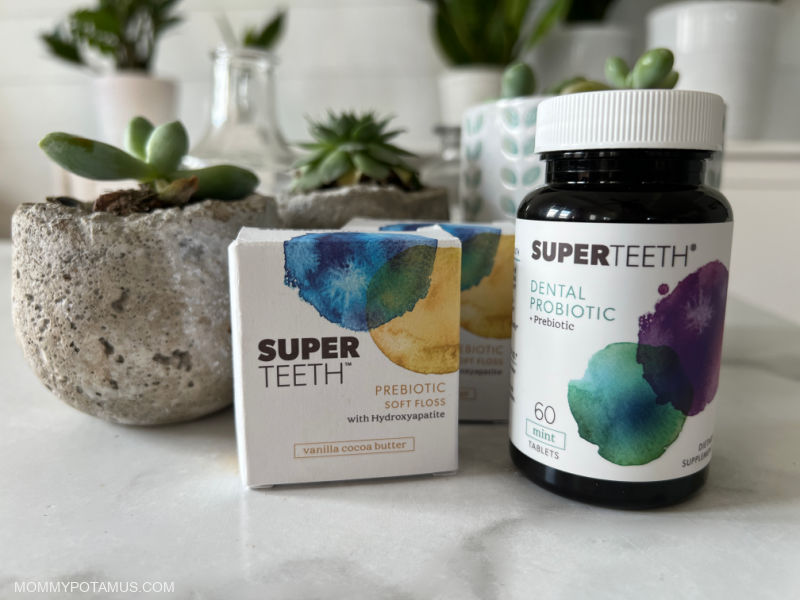
SuperTeeth Dental Probiotics
SuperTeeth uses three strains (Streptococcus salivarius M18, Lactobacillus reuteri, and Lactobacillus paracasei) that connect with all the benefits above.
This probiotic uses a higher concentration of Streptococcus salivarius M18 than many other brands I’ve seen, making it a good option for families who want to focus on healthy teeth/gums and fresh breath. The other strains they include support immune function and ear/nose/respiratory health.
Their formula is also designed to stimulate the salivary glands, which can help balance oral pH.
It’s safe for children, too. Here’s what they say:
Our dental probiotic is safe for children, but we always recommend checking with your pediatrician if you have any concerns. We also recommend parents use their best judgement as to whether the mints may be a choking hazard, however they may be cut or crushed for small children. (emphasis mine)
In a small, volunteer study conducted in collaboration with Bristle Health, SuperTeeth tested participants oral microbiomes before and after using their dental probiotic for 30 days. At the end of the trial, their dental probiotic changed the oral microbiome by encouraging the growth of beneficial bacteria and discouraging the growth of certain pathogenic bacteria. For example:
- Streptococcus mutans were fully eradicated in the volunteer that had this bacteria present in their mouth.
- Pepostreptococcus stomatis (linked to bad breath and gum issues) was eradicated in all volunteers
- The probiotic also encouraged the growth of beneficial bacteria such as Streptococcus gordonii and Streptococcus sanguinis.
Also, they’re a family-owned business and I love supporting them.
Click here and use code MP10 to save 10%. Free shipping on orders over $50.
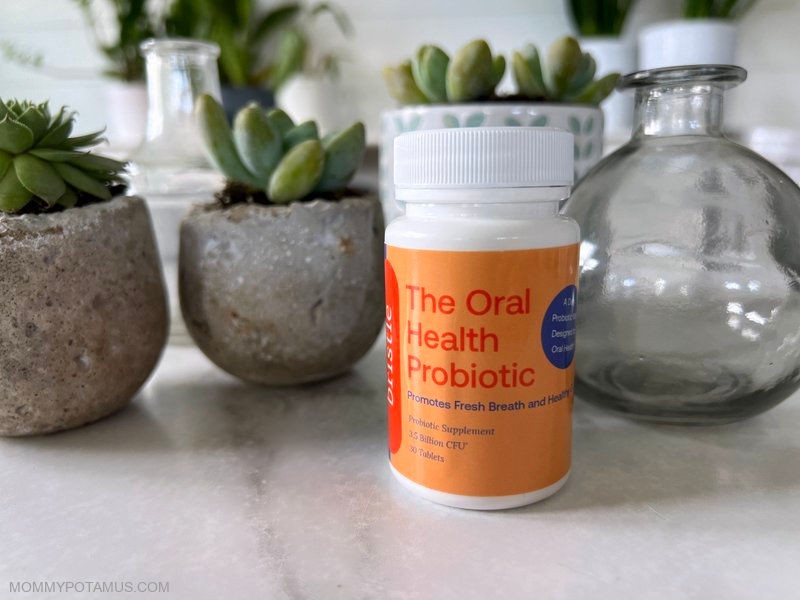
Bristle Health
If you’re curious what your saliva sample would reveal and your dentist doesn’t check before cleanings, Bristle offers an oral health test that measures 700+ bacteria, fungi and viruses in your saliva to help you understand your oral health and pinpoint imbalances before they become problems.
The results come with a custom plan to improve your oral health, plus discounts on products.
They also make a dental probiotic that incorporates six strains that are intended to prevent or reduce bad breath, gum inflammation and tooth decay:
- Lactobacillus plantarum
- Bifidobacterium lactis
- Lactobacillus reuteri
- Lactobacillus salivarius
- Streptococcus salivarius BLIS K-12
- Streptococcus salivarius BLIS M-18
Bristle’s dental probiotic is formulated for kids over five and adults.
Click here and use code MOMMYPOTAMUS to save 10%
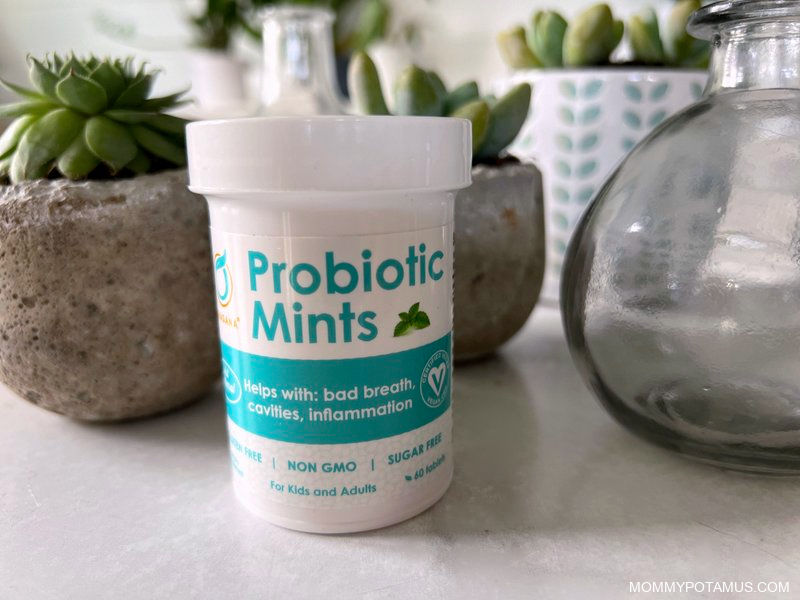
Orasana
Most dental probiotics are lactose-free, but may have trace amounts of casein since they are fermented with dairy. Although I’m dairy-free right now as part of my healing journey, I don’t react to the trace amounts of dairy found in most dental probiotics.
For those that do, though, Orasana Probiotic Mints are a completely dairy-free option. They don’t include the two most clinically studied strains – Streptococcus salivarius M18 and K12 – because they’re derived from dairy, but they do have several good ones. This is the brand I’d choose if I needed to avoid trace amounts of dairy.
According to Orasana, their mint are safe for children as long as usage guidelines are followed. They suggest 1-3 times a day and add that the recommended dose should not be exceeded. When given to toddlers, they suggest that the mint be crushed for easier consumption.
Click here and use code WELCOME to save $5 on your first order
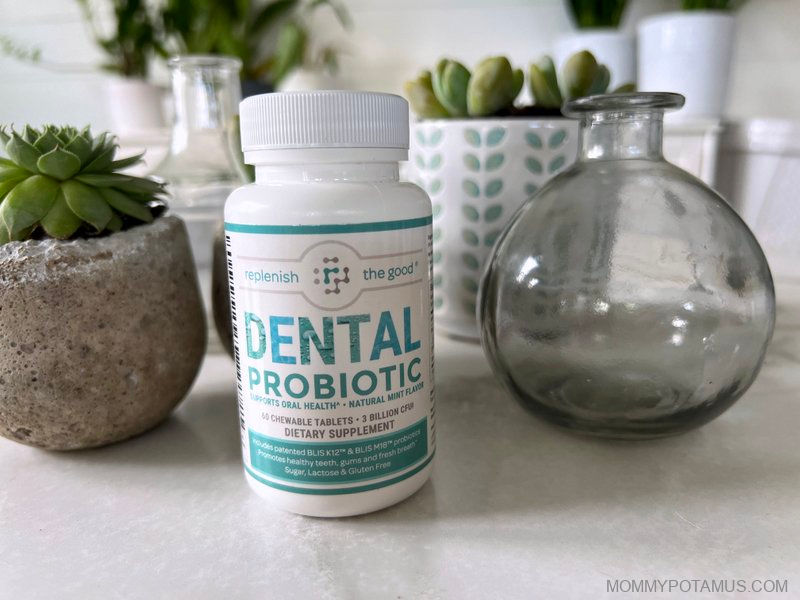
Replenish The Good
Replenish The Good Dental Probiotic contains four strains ( L. paracasei, L. reuteri, Streptococcus salivarius K12 and Streptococcus salivarius M18). Although it contains less M18 than some other brands, it does incorporate K12 which supports ear, nose and throat health.
The probiotic linked to above is just for adults, but they do have a kids version. I’ve never purchased it so I can’t speak from experience, but it may be another one worth considering.
Want more research-backed natural remedies?
No problem, I’ve created a free ebook for you – Kitchen Apothecary: 25+ Natural Remedies Using Ingredients From Your Pantry – as a gift for signing up for my newsletter. You’ll also get updates when I post about safe essential oils for pregnant/breastfeeding mamas, exclusive gifts and coupons (I was able to give away a jar of free coconut oil to anyone who wanted it recently!), plus other goodies.
Sign up using the form below.
This article was medically reviewed by Dr. Anna Cabeca, a gynecologist and obstetrician and a menopause and sexual health expert. As always, this is not personal medical advice and we recommend that you talk with your doctor.
Sources
1. NIH News In Health (2019) Mouth Microbes: The Helpful and the Harmful
2. Li, Yiwen et. al. (2022) The oral microbiota and cardiometabolic health: A comprehensive review and emerging insights
3. Dominy, Stephen et. al. (2019) Porphyromonas gingivalis in Alzheimer’s disease brains: Evidence for disease causation and treatment with small-molecule inhibitors
4. Wang, Shuang et. al. (2021) Fusobacterium nucleatum Acts as a Pro-carcinogenic Bacterium in Colorectal Cancer: From Association to Causality
5. Hezel, MP et. al. (2021) The oral microbiome and nitric oxide homoeostasis
6. Vanhatalo, Anni (2018) Nitrate-responsive oral microbiome modulates nitric oxide homeostasis and blood pressure in humans
7. Lozupone, Catherine et. al. (2012) Diversity, stability and resilience of the human gut microbiota
8. Di Pierro F et. al. (2015) Cariogram outcome after 90 days of oral treatment with Streptococcus salivarius M18 in children at high risk for dental caries: results of a randomized, controlled study
9. Di Pierro, Francesco et. al. (2015) Cariogram outcome after 90 days of oral treatment with Streptococcus salivarius M18 in children at high risk for dental caries: results of a randomized, controlled study
10. Stratum Nutrition (2020) Research & Patent Portfolio for BLIS Oral-cavity Probiotics: BLIS K12™ & BLIS M18™
11. Huang, Xuelian et. al. (2016) A Highly Arginolytic Streptococcus Species That Potently Antagonizes Streptococcus mutans
12. Teanpaisan, Rawee et. al. (2015) Effect of Long-Term Consumption of Lactobacillus paracasei SD1 on Reducing Mutans streptococci and Caries Risk: A Randomized Placebo-Controlled Trial
13. Alforaidi, Sahal et. al. (2020) Oral Colonisation after the Administration of Drops Containing Lactobacillus reuteri
14. Scientific American (2013) To Beat Bad Breath, Keep the Bacteria in Your Mouth Happy
15. Laleman, I. (2015) Probiotics in the dental practice: a review
16. Schlagenhauf, Ulrich (2020) Consumption of Lactobacillus reuteri-containing lozenges improves periodontal health in navy sailors at sea: A randomized controlled trial
17. Tomoki Maekawa and George Hajishengallis (2014) Topical treatment with probiotic Lactobacillus brevis CD2 inhibits experimental periodontal inflammation and bone loss
18. Gasta, Margaret G. et. al. (2017) Probiotics and Disease: A Comprehensive Summary—Part 5, Respiratory Conditions of the Ears, Nose, and Throat
19. Campanella, Vincenzo (2018) Oral probiotics influence oral and respiratory tract infections in pediatric population: A randomized double-blinded placebo-controlled pilot study
20. Burhenne, Mark (2020) The Oral Microbiome & Its Impact on Every Other System in the Body

